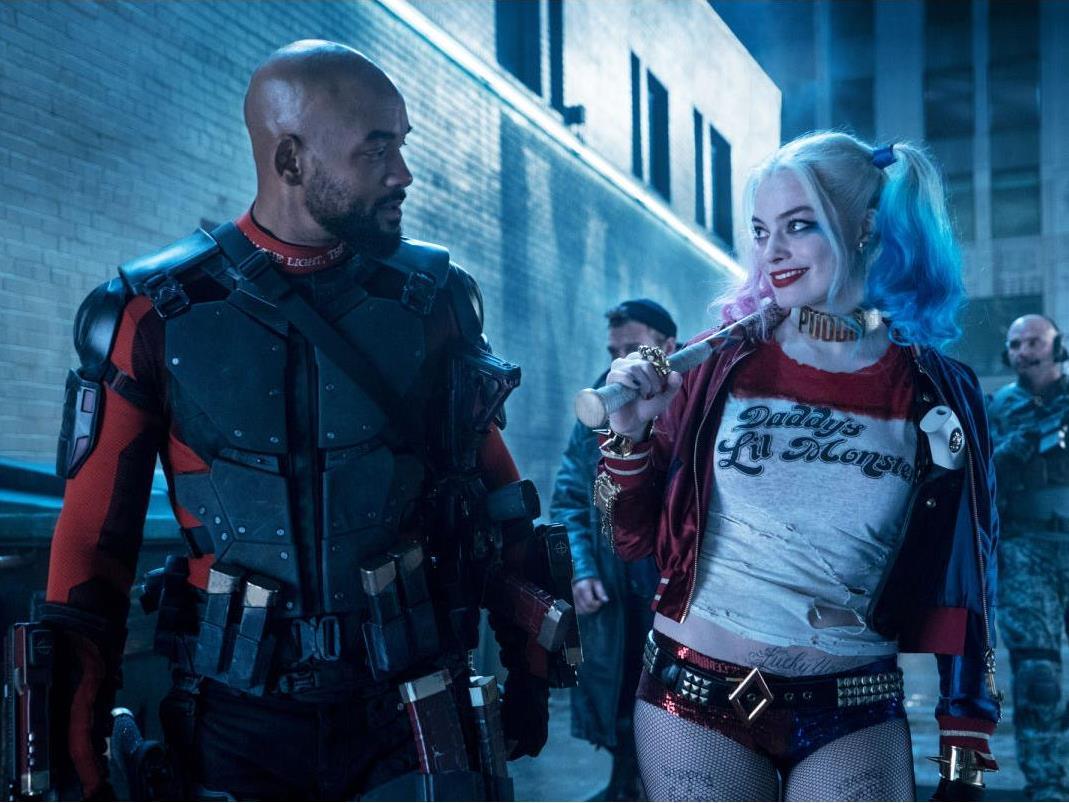Out of the mouths of babes, Suicide Squad spouts its mission statement — and hopes it’ll work its way through the ears and into the hearts and minds of the watching audience. “I know you do bad things. Don’t worry, I still love you,” reassures the daughter of Deadshot (Will Smith, Concussion), one of the film’s many villainous folks secretly charged with doing the government’s dirty work for the good of human existence. Throughout the 123 minutes that surround this exchange, writer/director David Ayer (Fury) endeavours to ensure viewers agree with these sentiments.
Like his fellow flawed protagonists in Midway City — such as former psychiatrist Harley Quinn (Margot Robbie, The Legend of Tarzan), fire-starting gang leader Diablo (Jay Hernandez, Bad Moms), brazen thief Captain Boomerang (Jai Courtney, Terminator Genisys), and the monstrous Killer Croc (Adewale Akinnuoye-Agbaje, Trumbo) — assassin Deadshot is given a chance to earn that affection courtesy of the intervention of intelligence operative Amanda Waller (Viola Davis, TV’s How to Get Away with Murder). After wondering what would happen if a Superman-like figure didn’t share the nation’s values, she convinces her superiors to approve their release into her custody. Forming a covert team overseen by patriotic commander Rick Flag (Joel Kinnaman, House of Cards), they’re tasked with thwarting the Joker’s (Jared Leto, Dallas Buyers Club) plan to reunite with his paramour Quinn, and defeating an ancient foe known as the Enchantress (Cara Delevingne, Pan).
Gathering a motley crew of misfits, making them band together for a common cause, challenging preconceptions, compelling a change of opinion, and tackling formidable enemies all follow; if it sounds like a generic superhero plot, even in the DC Comics Universe’s effort to branch beyond its other famous entities, that’s because it is. Suicide Squad adheres to the genre’s formula and is happy to do so, though the end result is a messy mashup of expected elements given a murkier and cheekier filter more than a genuine attempt to offer an alternative to the usual caped crusader fare, regardless of how strenuously it tries to convince viewers otherwise.
Indeed, from the moment that each character’s introduction is marked with a heavy-handed music cue, on-screen text relating relevant particulars, and a brief flash of their backgrounds, Suicide Squad proves a jukebox of a superhero movie. The idea of throwing a heap of hit components into one package — and relying upon the combined power of familiarity and an engaging soundtrack — isn’t new, with a raft of musicals predicated upon the concept. Ensuring recognisable tracks like the Rolling Stones’ Sympathy for the Devil and Rick James’ Superfreak blast their beats at the audience, switching between protagonists in the same way one might skip between tunes, and fashioning the thinnest and most predictable of narratives to tie it all together, Ayer simply applies the same mechanics to a different realm.
In the first addition to the current DC film fold without Batman v Superman: Dawn of Justice‘s Zack Snyder at the helm, he also employs a handful of other overt flourishes to fill the obvious gaps around his mixtape-like effort — and hew closely to the house look and feel, as well. The reliance on unconvincing CGI can’t retain interest once the underlying story reverts to going through the motions, and thrusting the feature’s devil-may-care outlook in viewer’s faces through Roman Vasyanov’s (Rise) choppy camerawork and John Gilroy’s (Nightcrawler) rapid editing swiftly becomes grating rather than boldly endearing. In fact, though they suit the grab-bag construction Ayer favours, the majority of his stylistic choices work against the film’s case that something horrible can still have its merits. There’s little about Suicide Squad that isn’t an unsubtle onslaught; however such an array of erratic images does make its energetic but all-too-prominent tunes and its constant need to link into its fellow comic book fare more bearable.
Of course, over-stressed aesthetics aren’t the only way that the feature lessens any meaningful engagement in its heinous but affable central conceit. There’s never any question that the titular group have their reasons for their behaviour, meaning that there’s no tension around or earned sense of redemption stemming from them as a result. Indeed, the film’s treatment of its characters is as simplistic as its visual approach is overstuffed. For all the pre-release attention afforded Leto’s take on the Joker, his imitative turn is scarcely more than a cameo; many of the movie’s other actors are given one-note parts and relegated to group squabbles and loitering in the background.
Focus co-stars Smith and Robbie fare considerably, welcomely, and pleasingly better, with Ayer asking the duo to carry the bulk of feature. While one plays a killer with a heart and the other unhinged through love and trauma, they’re given room to impart more nuance than exists elsewhere in the film. Inducing a yearning for future installments that make the most of their talents and their characters is Suicide Squad‘s main achievement, other than revelling in its jukebox playlist-like design. Inciting a similar desire for a time when superhero flicks strive to be more than an intermittently entertaining, adequate-at-best amalgam of their predecessors, dressed up with an ensemble roster and an irreverent attitude, is an unavoidable consequence.
Rating: 2 ½ stars out of 5
Suicide Squad
Director: David Ayer
USA, 2016, 123 mins
Release date: 4 August 2016
Distributor: Roadshow
Rated: M
Actors:
Director:
Format:
Country:
Release:





